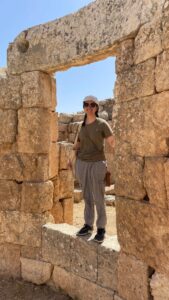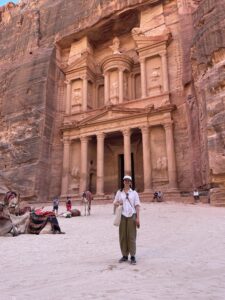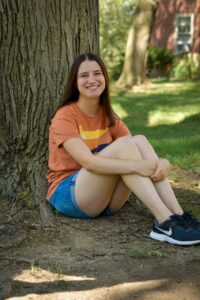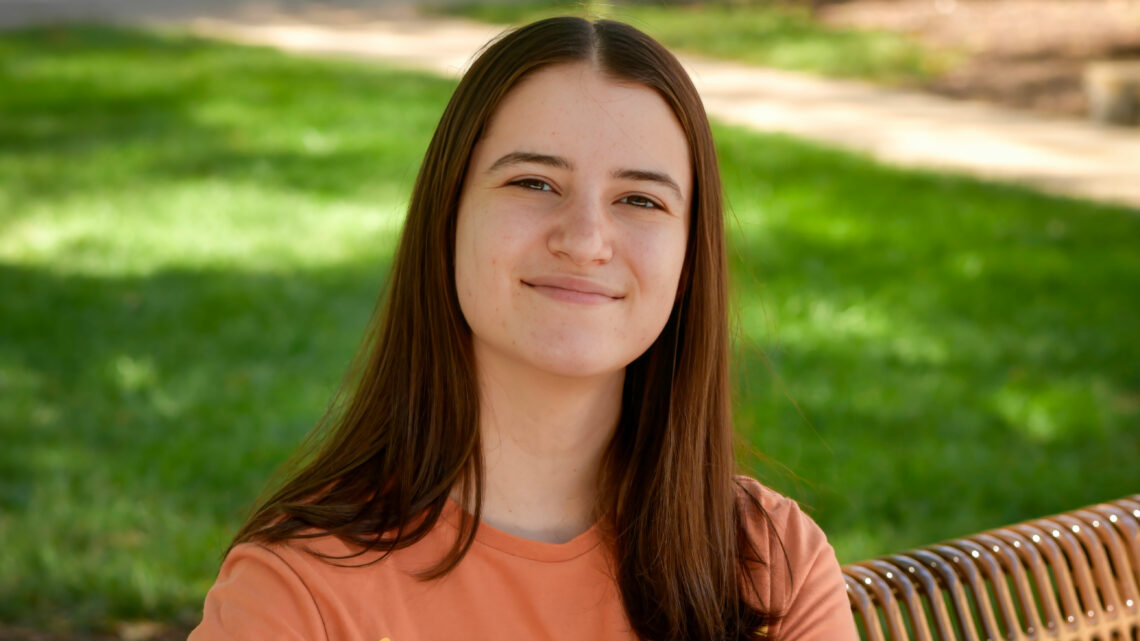The Jordan River. Ajloun Castle. Petra. The Dead Sea. Wadi Rum. Senior international relations and history major Aubrey Benton explored all these places this summer—on the U.S. Department of State’s bill.
Benton explored all these places this summer—on the U.S. Department of State’s bill.
Benton was one of 24 Arabic language students selected to study in Amman, Jordan, through the Critical Language Scholarship program. The CLS program is sponsored by the U.S. Department of State and is designed to rapidly improve the language skills of university students through cultural immersion in regions deemed crucial to national security and economic prosperity. All flights, room and board and tuition is paid for by the program for the eight weeks students spend overseas. For Benton, this opportunity came as a result of a conversation with her advisor three years ago.
Benton chose Union College for its unique approach to international relations. As a freshman, her advisor encouraged her to choose a language and region to focus her studies on. Benton said, “International relations students have to take one year of a language, but we’re encouraged to continue our studies beyond that. Since Union is so close to the University of Nebraska-Lincoln, we can take classes there if Union doesn’t offer the language we want to learn. I saw UNL offered Arabic classes, and I thought, ‘That sounds interesting.’ And so I enrolled in a class.”
As she studied Arabic and the culture of North Africa and the Middle East, Benton fell in love with the language and region. She decided to add Arabic as a minor, transferring her credits from UNL to Union. When her advisor at Union told her about the CLS program, she jumped at the chance to experience the Middle East firsthand. “I knew it would be a good opportunity to actually get a chance to interact with Arabic speakers,” she said. “I put a lot of time and effort into learning Arabic in classes, but without that step forward, it wouldn’t be a skill I could use in my career.”
 While in Jordan, Benton took five days of Arabic classes each week at the Jordan Language Academy, a school created to teach Arabic as a second language. Benton said, “Unlike most programs in the U.S., we learned both Modern Standard Arabic and the local dialect, which was a really exciting opportunity because it allowed us to actually understand and speak to individuals within the country.”
While in Jordan, Benton took five days of Arabic classes each week at the Jordan Language Academy, a school created to teach Arabic as a second language. Benton said, “Unlike most programs in the U.S., we learned both Modern Standard Arabic and the local dialect, which was a really exciting opportunity because it allowed us to actually understand and speak to individuals within the country.”
In between studying and spending time with her host family, Benton had the opportunity to explore. She visited the Dead Sea and the churches of Madaba and Ajloun Castle, as well as many other places. “I visited where Jesus was baptized in the Jordan River,” she said. “That was really fun.” But her favorite trip by far was the overnight journey to Petra and the desert of Wadi Rum. “It’s impossible to describe how beautiful it is there,” she said. “It’s just incredible. The other students and I spoke a lot of Arabic on that trip, which helped us improve.
“I really appreciated getting to know the other students in the program,” added Benton. “They were from across the United States; there was a lot of ethnic and religious diversity in the group. Your religious identity is such an important thing in Jordanian culture that it sparked a lot of conversations about our own faith backgrounds. I got to have really interesting conversations with people who had some incredible insights into what their faith means to them. We were all supporting each other through this challenging program and trying to learn the most we could.”
All Benton’s studying and exposure paid off: her Arabic skills improved greatly over the summer. “The last trip I took in Jordan was to Mukawir (also known as Machaerus), the fortress where John the Baptist was beheaded,” she said. “I took a bus to Madaba with friends, and from there it’s an hour drive to Mukawir. By then I felt comfortable enough in Arabic to go to a taxi driver and ask him to take me. We were able to hold a conversation for the three hour trip. He showed me around and shared insights he knew from living there. When I arrived in Jordan, I never imagined having the confidence or the language skills to connect with someone like that.”
was to Mukawir (also known as Machaerus), the fortress where John the Baptist was beheaded,” she said. “I took a bus to Madaba with friends, and from there it’s an hour drive to Mukawir. By then I felt comfortable enough in Arabic to go to a taxi driver and ask him to take me. We were able to hold a conversation for the three hour trip. He showed me around and shared insights he knew from living there. When I arrived in Jordan, I never imagined having the confidence or the language skills to connect with someone like that.”
Benton’s experiences in Jordan changed her idea of her calling. “I thought I was just going to go to law school, but while talking with people on similar academic paths as me, I realized I am definitely interested in working in foreign aid and in serving refugees. I want to be able to have one-on-one conversations with Arabic speakers, especially now that I have the confidence in my language skills to pull that off. I really appreciate that I had the opportunity to learn that about myself.”
Annika Cambigue is a senior English and communication major at Union College.










